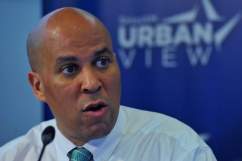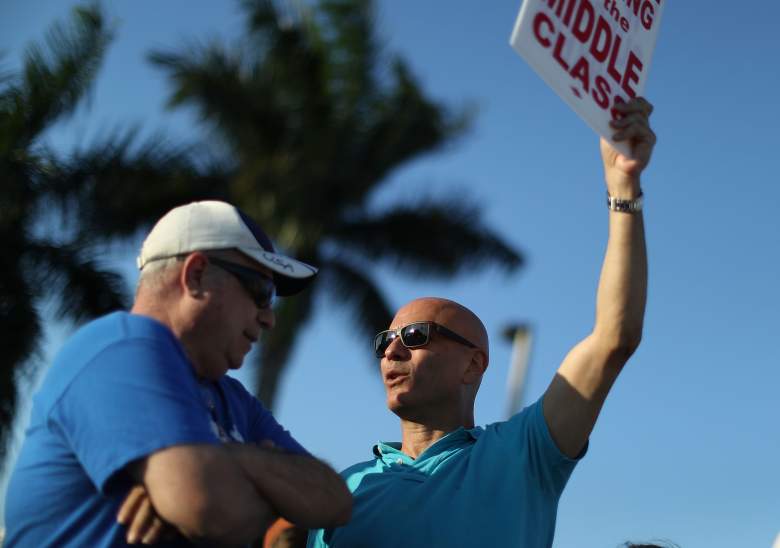
Canova, a Democratic candidate for Congress against Rep. Debbie Wasserman Schultz, in May. (Getty)
Tim Canova, a self-described progressive Democrat, is running a primary election campaign against former Democratic National Committee chair and U.S. Rep. Debbie Wasserman Schultz in Florida’s Aug. 30 primary. Canova has received the endorsement of Sen. Bernie Sanders and some support from the “Our Revolution” organization, but is might not be enough to have him beat the 49-year-old Congresswoman.
Canova was 10 points down in polls heading into the primary election, according to the Tampa Bay Times.
His “shake up Congress” platform includes Sanders-like phrasing: challenging Wall Street, rigged economic and political systems, and corporations “leaving ordinary Americans behind.”
Canova, like Wasserman Schultz and Sanders, is originally from New York, he has worked on Capitol Hill and said he joined the Occupy Wall Street movement, according to his campaign bio.
Here’s what you need to know about Canova:
1. Canova Is Riding the Bernie Sanders ‘Our Revolution’ Wave
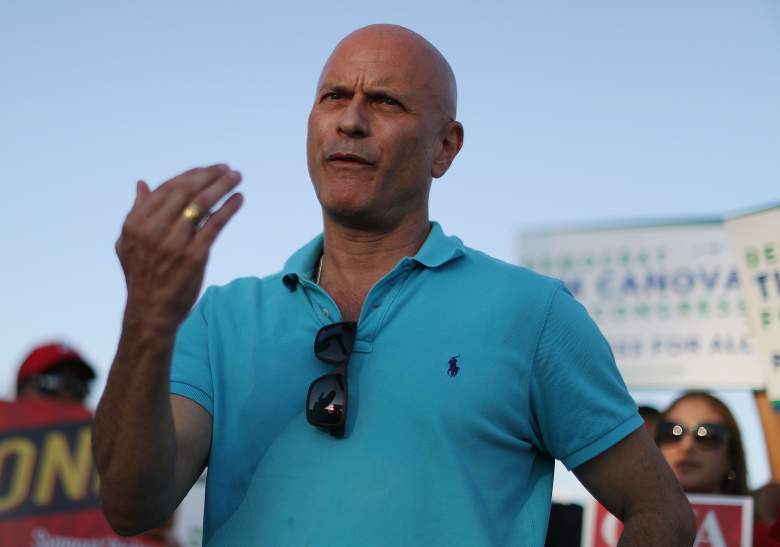
Canova outside a CWA protest in May in Florida. (Getty)
When Canova announced he would run against Wasserman Schultz, he jumped on the Sanders revolution bandwagon, saying he gets that the economy is rigged, wants to reform Wall Street and legalize marijuana. When the Sanders presidential bid died on the floor of the 2016 Democratic National Convention (if not earlier), Canova still boasted the Vermont senator’s support and that of a splinter organization, “Our Revolution,” which looks to help Sanders-minded candidates.
Canova’s platform states he wants to get the money out of politics and eliminate political action committees (PACs), end the war on drugs and focus on sentencing reform, address climate change, make higher education more affordable and expand health care and Medicare to all.
2. Canova Was Endorsed by Sanders, but Bernie Never Showed up to Support the Florida Democrat
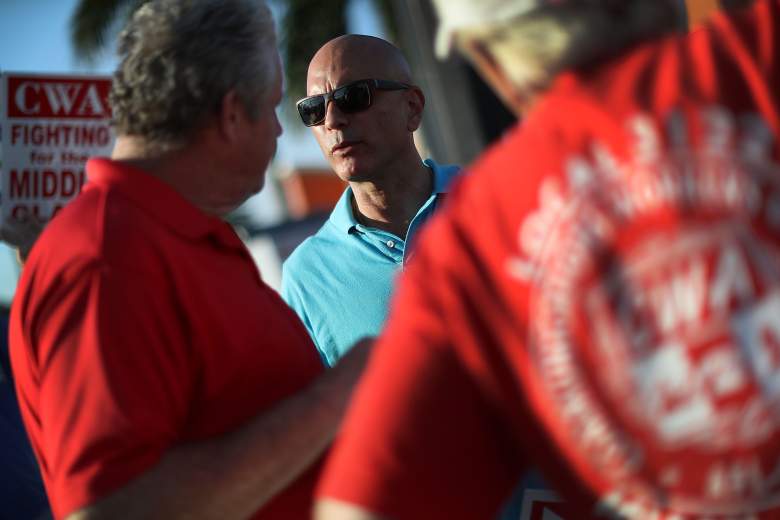
Canova received support from “Our Revolution,” the organization hoping to continue the Sanders revolution campaign after the Democratic socialist senator stepped away from his presidential campaign. (Getty)
In a piece in The Atlantic called “How the Political Revolution Failed Tim Canova,” Clare Foran explains that even though Canova received the endorsement of Sanders, the Vermont senator never showed up to South Florida to campaign with Canova. In fact, the Our Revolution organization, which underwent a leadership change, wasn’t able to properly connect with the Canova campaign like it was intended to.
“I would absolutely say the prohibition on coordinating hurt the Canova campaign,” Paul Schaffer, the former data and analytics director for Our Revolution, told The Atlantic. “We have an enormous core of dedicated volunteers. But when Our Revolution was set up as a 501(c)(4), that prevented us from mobilizing that big pool of Bernie supporters to work jointly with the campaign to get out the vote.”
“Well, clearly, I favor [Wasserman Schultz’] opponent,” Sanders told CNN‘s Jake Tapper. “His views are much closer than mine than as Wasserman Schultz’…”
Wasserman Schultz has been endorsed by President Barack Obama and Democratic presidential nominee Hillary Clinton.
Canova told left-leaning The Young Turks, “Frankly, it is a been disappointing” that Sanders never showed up. “He raised a lot of expectations, which I think encouraged a lot of the Super PAC money to quickly start flowing here to help Wasserman Schultz. It galvanized the establishment; it motivated them to mobilize and defend Wasserman Schultz… Whereas, we have nobody coming here to campaign for us.”
3. The Week Before the Florida Primary, Support for Canova was Waning
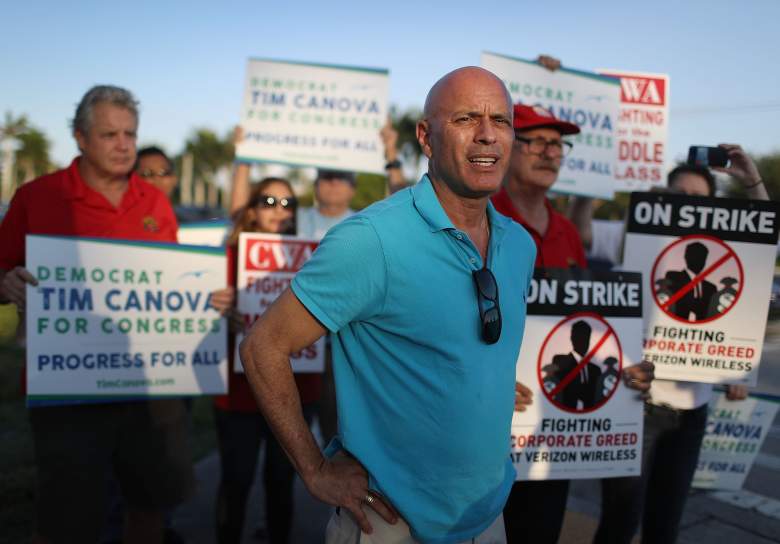
Canova was endorsed by Sen. Bernie Sanders, but Sanders never showed up to stump for the Florida Democrat. (Getty)
At the end of July, shortly after Wasserman Schultz became embroiled in controversy over her leadership and the Democratic Party’s negating Sanders’ presidential campaign, Canova announced he was within striking distance of the incumbent. A poll showed he was at least three percentage points behind Wasserman Schultz, and at most, eight percentage points.
But last week, the Sun-Sentinel released a poll showing Wasserman Schultz had climbed to a comfortable 10 percentage point lead in the primary race.
“He’s doing better, at least in our polling numbers, than typically a challenger to an incumbent does,” said FAU political scientist Kevin Wagner in the Sun-Sentinel. “Ideally, if you’re the incumbent, you’d like to have a bigger cushion. But I don’t think there’s an election where a person looks at a poll and sees they’re up by double digits and thinks that’s a bad thing.”
4. In a Money Battle, Latest Filings Show Wasserman Schultz Is Losing to Canova
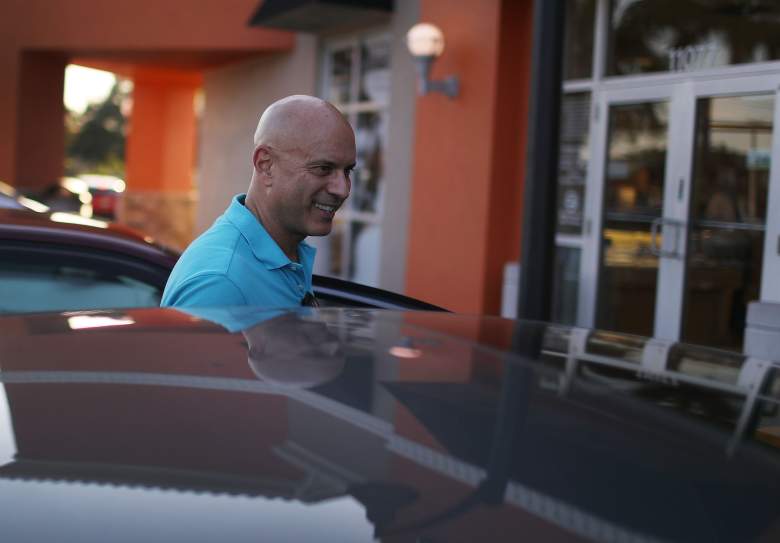
Canova getting into his car after a protest with CWA members. (Getty)
When Canova claimed “establishment” money was pouring into the Wasserman Schultz campaign to mobilize and defend the Congresswoman, he was also receiving a load of campaign cash. In fact, as of the last reports Aug. 10, Canova had raised more money than Wasserman Schultz — nearly $3.3 million to her $3.08 million.
The federal campaign filings show Canova has received all his money from individuals — even if it was through political action committee for individuals ActBlue. Schultz, on the other hand, has received 70 percent of her contributions from individuals and 20 percent from other sources, records show.
The campaigns are spending their money on television ads like these: Canova singling out Wasserman Schultz’ ties to “big sugar” is hurting the environment:
And Wasserman Schultz instead not naming Canova and focusing her attention on battling the likes of Donald Trump.
5. Supporters Say This Primary Is a ‘True Test’ of the Sanders’ Progressive Movement
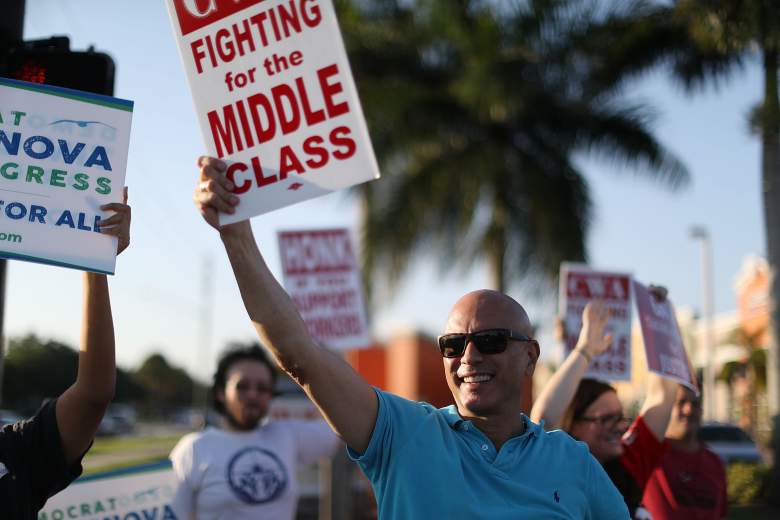
Tim Canova is running a primary against Rep. Debbie Wasserman Schultz. (Getty)
Supporters have said the Aug. 30 election is a “true test” of the Berniecrats and their grassroots campaign:
“We’ve really got so much grassroots energy coming our way right now. The momentum is all on our side,” Canova told CNN’s Wolf Blitzer in a Monday interview.



